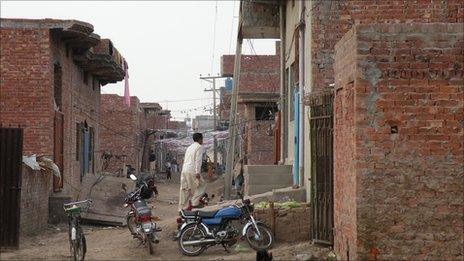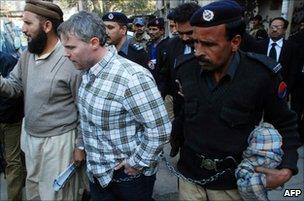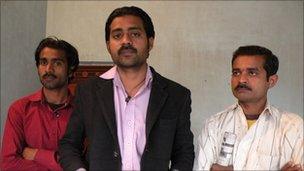Behind the scenes of Pakistan Raymond Davis 'spy' saga
- Published

In a modest home in Lahore, the family of Mohammad Faheem have been visited by various hardline religious groups
The shooting of two Pakistani men by a US official has ignited a bitter diplomatic row. Amid rumours of blood money and CIA spies, the BBC's M Ilyas Khan went to Lahore to find the victims' case has been adopted by hardline religious and political groups.
On January 27 2011, an American man shot dead two Pakistani men. That much we know.
His name is Raymond Davis - but many in Pakistan question whether that is his real name. The US says he is an embassy official; unnamed US officials have claimed he is a CIA contractor.
The two men he shot were 18-year-old Mohammad Faheem and Faizan Haider, 23. Mr Davis says the men, who were riding a motorcycle, pulled over at his side at a traffic light and pointed a gun at him.
He says he shot both men in self-defence. Shortly afterwards a second car belonging to the US embassy killed a bystander at the scene of the incident.
Every twist and turn that has unfolded since then would test the imagination of the most inventive of spy novelists.
Blood money
When I went to Lahore, I found that militant groups were pressuring the families of the victims to refuse offers of "blood money" from the US in order to keep the case alive - it is a rallying cry for anti-US sentiment in Pakistan.
But the latest development was buried deep in the Pakistani newspapers last week. It was a report about a man taken to hospital after intruders tried to force poison down his throat.
The man in question was Mohammad Sarwar, the uncle of Shumaila Kanwal, the widow of one of the men shot by Raymond Davis.
Soon after her husband's death, Ms Kanwal went to live at her uncle's house in the city of Faisalabad. Shortly afterwards she committed suicide by swallowing rat poison.
In a statement before her death, she said she wanted to kill herself because she did not expect the government to bring Raymond Davis to justice.
I was with their relatives in Lahore the day before the alleged attempt on Mr Sarwar's life.

Raymond Davis says the men were trying to hijack his vehicle at gunpoint
I was ushered into a room where some of the men from the family were sitting quietly, listening to two visitors who introduced themselves as members of a well-known militant group based in Punjab.
One of them had spread out a local newspaper before him in which there was a report that Ms Kanwal's family in Faisalabad were considering an offer of blood money to pardon Raymond Davis.
He folded the newspaper and said, "two more reports like this, and the entire public support we have built up will vanish.
"You must get in touch with Sister Shumaila's family and tell them to deny the report. We have the gora [the white man] in our clutches and we must not let him escape.
When the men were leaving, the one with the newspaper asked, "so what message you want to send to (my organisation)?"
"We haven't been approached with an offer of blood money, but if such offer is made, we will not accept it," replied one of the family members.
These incidents reflect the amount of pressure which some religious groups are applying to prevent the families of the men from reaching an out-of-court settlement with Raymond Davis.
Under Pakistani laws, the heirs of a murder victim can pardon the killer in return for the payment of blood money.
Punjab disagrees
The Pakistani government, which apparently issued Mr Davis a diplomatic visa, seems inclined to release him and end the diplomatic row.
The idea of blood money has been floated by Prime Minister Yousuf Raza Gilani as one of the options available.
But the government's task is being made difficult by hardline religious groups such as Jamaat-ud-Dawa, Jamaat-e-Islami and others.

Mohammad Waseem, elder brother of one of the men killed, spoke to witnesses at the scene
These groups have been holding protests and are "threatening … massive street agitation if Raymond Davis is not tried and convicted in Pakistan," says Dr Hasan Askari Rizvi, a Lahore based political analyst.
There is an added consideration.
The views of the provincial government of Punjab also "lean heavily towards the Islamists' perspective", says Dr Askari.
He says the PML-N party, which rules the Punjab province, knows "the mood in the streets (and) is not willing to help the federal government".
Punjab Law Minister Rana Sanaullah has previously accused the federal government of "creating confusion" over the issue of Raymond Davis' immunity.
Dr Askari also says a section of the media has also joined these forces "in an attempt to expose what they describe as the slavish mentality of the Pakistani government." So there is potentially conflict between local and central government.
Motives?
The Lahore case is also full of apparently motiveless actions.
Mohammad Waseem, the elder brother of Mohammad Faheem, tells the BBC that soon after the 27 January shoot-out, he went to the scene and spoke to eyewitnesses and the police to find out what had happened.
"Davis' car had a small accident on the road. My brother and his friend, who were on a motorbike, saw the accident and tried to stop him but he sped away. They chased him and caught up with him at the Mazang Chungi traffic signal where he had stopped due to the red light."
Since both boys were armed with pistols, Mr Davis' plea of self-defence sounded credible at first.
But the Punjab police in their investigation focused on evidence that contradicted Mr Davis.
According to the police report placed before the court, a copy of which the BBC has seen, none of the guns found on the men had been cocked, suggesting that Mr Davis acted without being threatened.
But the report does not attempt to establish Mr Davis' motive.
Lahore police chief, Aslam Tareen, says that "nothing has come to light regarding the motive. (Davis) took the plea of self defence which we have investigated fairly."
The other apparently motiveless attack was the attack on Mr Sarwar. He lodged a complaint with the police saying three men broke into his house, beat him up and tried to force poison into his mouth.
Neither the family nor the police have explained the motives of the assailants. Was it related to an alleged blood money offer?
But one thing is clear: there will be more twists, more events without explanation and more bitter recriminations on a domestic and international level.